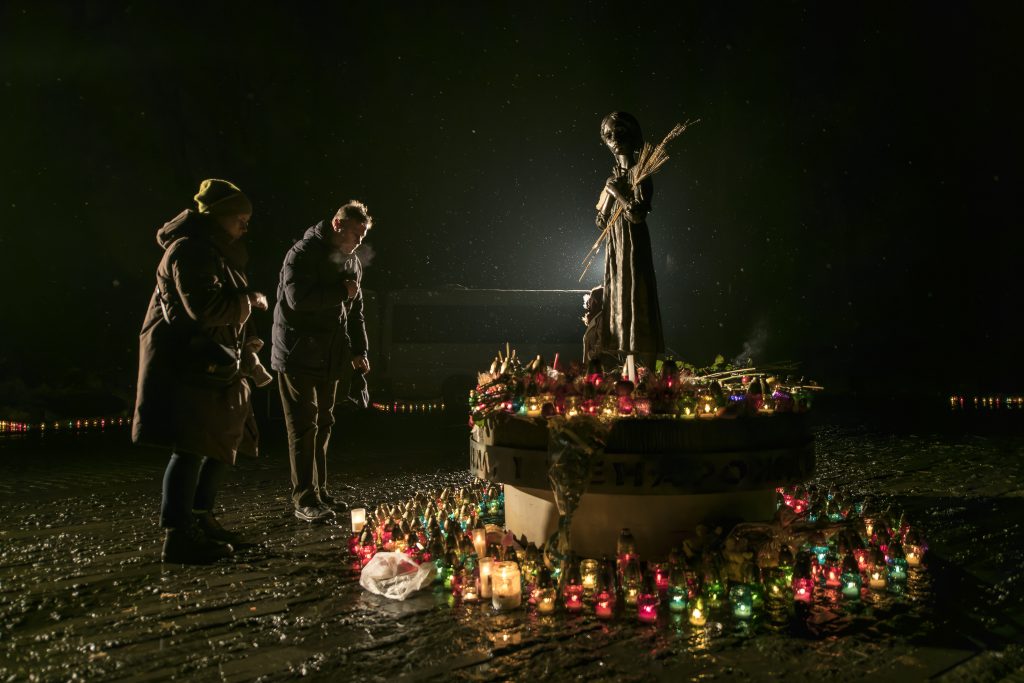By Kristina Hook, for UkraineAlert
As Russia’s full-scale invasion approaches the two-year mark with no end in sight, Ukrainian resolve remains unshakable. One entirely typical recent poll found that 84 percent of Ukrainians reject the idea of ceding any territory to Russia in exchange for peace. What is driving this remarkable resistance?
Ukrainian national pride is understandably booming thanks to the successes of the country’s military and the unifying power of the war effort. But for most Ukrainians, the main factor fueling their determination to fight on is the sense that Russia’s genocidal objectives leave them with no choice but to resist. Either Ukrainians defend themselves, or Ukraine itself will cease to exist.
Examples of the Russian military’s genocidal conduct in Ukraine and the Kremlin’s genocidal intent continue to mount. In recent weeks, human rights investigators have released new evidence accusing Moscow of a deliberate starvation campaign that appears to have been in place before the start of the full-scale invasion. This has been accompanied by calls for Russia to face new war crimes charges of “starvation as a method of warfare.” Accusations of weaponizing food come as Ukrainians mark a major anniversary of a remarkably similar crime committed by the Kremlin almost a century ago.
In late November, Ukrainians commemorate the artificial famine of the early 1930s known as the Holodomor. One of Stalin’s most notorious crimes, this deliberately engineered famine killed at estimated four million Ukrainians in less than two years. Declassified Soviet records now depict Stalin’s behavior as part of a broader campaign to extinguish Ukraine’s statehood aspirations.
Stalin’s bid to crush Ukraine’s dream of independence ultimately failed. Millions of Ukrainians would continue to resist Soviet rule, becoming the largest group of political prisoners during the final decades of the Soviet Union before playing a critical role in the eventual collapse of the USSR. Nevertheless, many irreplaceable features of Ukraine’s cultural heritage were lost forever during the Holodomor. Raphael Lemkin, who first coined the term “genocide,” saw Stalin’s attempt to destroy the Ukrainian nation as “the classic example of Soviet genocide.” There is now a growing scholarly consensus that defines the Holodomor as an act of genocide committed against Ukraine.
Modern Ukrainians are acutely aware that their freedom is not free. Most have a friend or family member who has been killed or wounded in Russia’s invasion. Many are also the descendants of people killed by the Stalin regime.
In June 2017, I interviewed Ukrainian museum director Ihor Poshyvailo about the Holodomor, asking how Ukrainians should commemorate Moscow’s past violence. Now, Poshyvailo finds himself working around-the-clock to prevent Moscow’s latest attempt at destroying Ukraine’s cultural heritage. He has condemned modern Russia’s escalating aggression against Ukraine as a genocide and has called the current invasion “a war against our historical memory, against our being Ukrainian.” These accusations are increasingly supported by independent inquiries.
Genocides are called the “crime of crimes” because they target a group’s basic right to exist. In historical terms, genocides are exceedingly rare, complicating scholarly understandings of how this extreme behavior unfolds. Russia-Ukraine relations are remarkable in this regard, as Kremlin dictators are now accused of committing genocide against Ukrainians twice in just ninety years.
Not everyone is surprised. Historian Daria Mattingly, who has studied the Holodomor’s rank-and-file perpetrators, says the genocidal violence of the current Russian invasion reflects the nature of the Putin regime. “As an unapologetic imperial power, Moscow consistently treats the people it oppresses as resources, not human beings worthy of rights and protections,” she comments.
Moscow’s atrocities in Ukraine blur the lines between past and present. Today, eastern Ukraine’s Kharkiv region is relentlessly bombed from just over the Russian border. Grief at the senseless destruction pours out of residents. “Life used to be beautiful here. They have left us without our loved ones, without our parents, without husbands, without sons, without our previous life, without jobs, without anything,” newly widowed Olga recently told a reporter.
Kharkiv also experienced terrible suffering during the Holodomor, when it was among the most badly affected regions of Ukraine. In 1932, a 36-year-old schoolteacher, Oleksandra Radchenko, kept a private diary, later serving ten years in a Soviet gulag after it was discovered by the Soviet authorities. Describing whole villages dying out, she wrote, “I am so afraid of hunger; I’m afraid for the children. It would not be so offensive if it were due to a bad harvest, but they have taken away the grain and created an artificial famine.”
For some Ukrainians, understanding the Holodomor’s long-suppressed history has been key to reclaiming their national identity. In 2019, I sat down with renowned scholar and theologian Ihor Kozlovskyi. Detained by Russia’s proxy forces in eastern Ukraine in 2016, he was tortured for nearly two years before being released in a prisoner exchange. When I asked him why understanding the Holodomor was important for modern Ukrainians, he told me this was the only way “to build our truly independent state free of aggression and dictatorship.”
Kozlovskyi passed away from a heart attack this year, but his words remain more important than ever. Learning from the past also holds a somber warning for the West. Despite strenuous Soviet efforts to hide information about the Holodomor, some intrepid journalists raised the alarm even as the genocide unfolded. Notwithstanding these news reports, personal appeals, and confirmation from his own diplomats, US President Franklin Roosevelt officially recognized the Soviet Union in November 1933, spurred on by what some scholars now call a mixture of US economic self-interest and realpolitik.
Today, many Western leaders continue to insist Putin cannot be allowed to repeat Stalin’s crimes. But Ukrainian pleas for comprehensive aid to expel Russian forces and finally break this violent cycle are only being partially addressed. On the anniversary of the Holodomor, Western leaders have the opportunity to bring life-saving poetic justice to the people of Ukraine, fighting against the memories and brutal realities of two Kremlin dictators.
By Kristina Hook, for UkraineAlert
Kristina Hook is Assistant Professor of Conflict Management at Kennesaw State University and a nonresident senior fellow at the Atlantic Council’s Eurasia Center.





